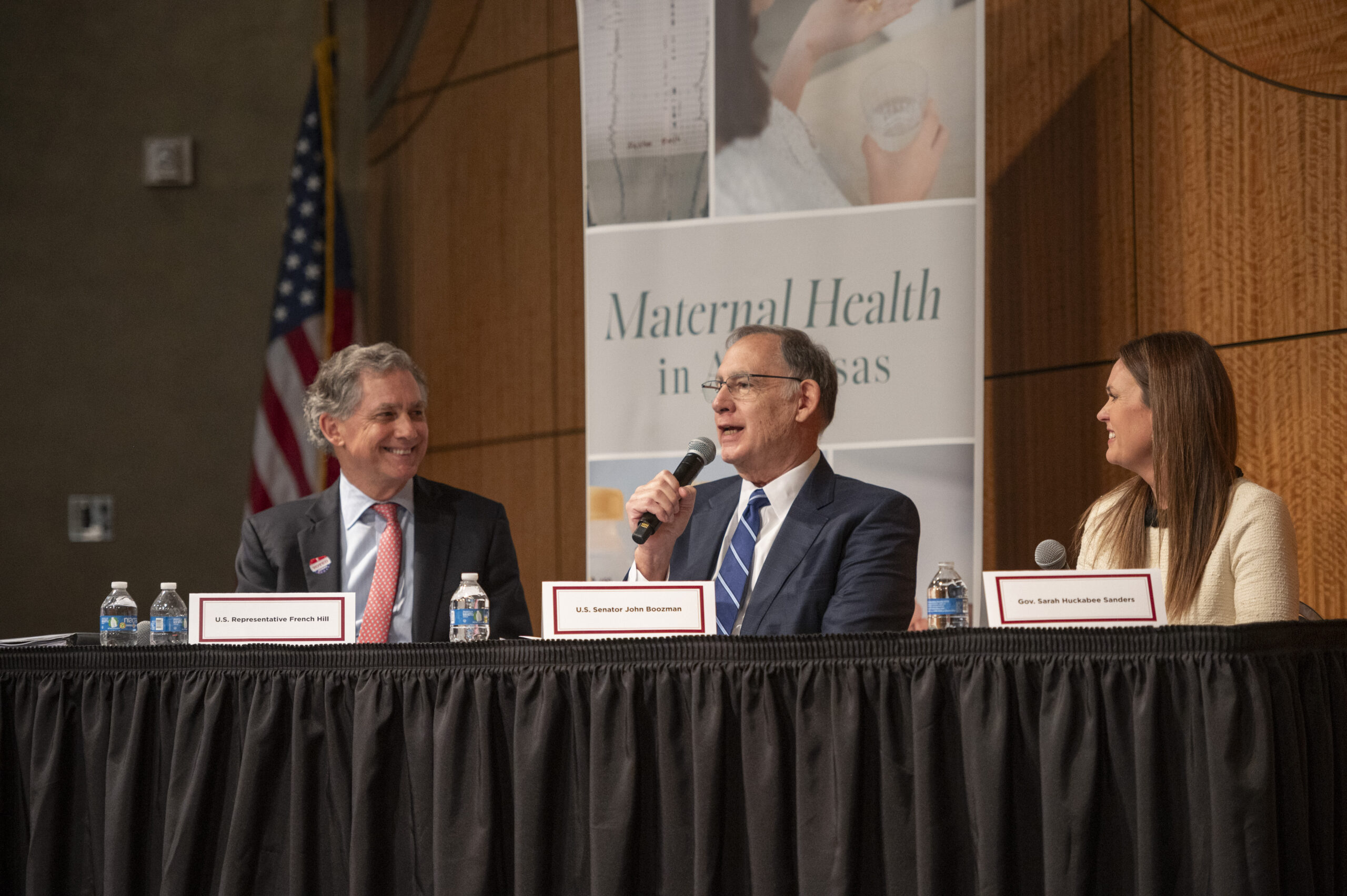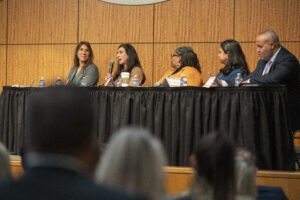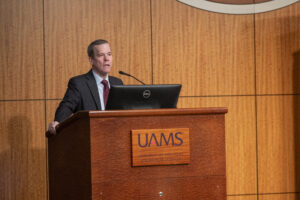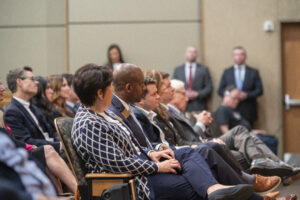View Larger Image

Rep. French Hill, Sen. John Boozman and Gov. Sarah Huckabee Sanders hosted a roundtable discussion on maternal health in Arkansas.
Image by Evan Lewis
Gov. Sanders, Sen. Boozman and Rep. Hill Host Maternal Health Roundtable at UAMS
| The University of Arkansas for Medical Sciences (UAMS) welcomed the public to the Fred W. Smith Conference Center for a roundtable discussion on maternal health in Arkansas, an event hosted by Gov. Sarah Huckabee Sanders, Sen. John Boozman and Rep. French Hill.
The event brought together preeminent health care professionals from across the state for a dialogue on ways to improve maternal outcomes for women and their babies.
Cam Patterson, M.D., MBA, UAMS chancellor and CEO of UAMS Health, opened the Feb. 21 event, welcoming guests to this landmark discussion on maternal health.
“Arkansas’ rate for maternal mortality is almost twice as high as the national average and is particularly high in disadvantaged areas,” said Patterson. “The good news is that we are committed to making a change, and our panel today is here to help us explore ways to improve maternal fetal outcomes. I want to thank Gov. Sarah Huckabee Sanders, Sen. John Boozman and Rep. French Hill for their commitment to this important issue and helping us assemble this roundtable.”
Representing many of the top experts on maternal health in Arkansas, the panel included:
- Nirvana Manning, M.D., chair and professor of the UAMS Department of Obstetrics and Gynecology and director of women and infant services at UAMS
- Lanita White, Pharm.D., chief executive officer of Community Health Centers of Arkansas
- Sharmila Makhija, M.D., MBA, founding dean and chief executive officer of Alice L. Walton School of Medicine
- William “Sam” Greenfield, M.D., MBA, medical director of Family Health with the Arkansas Department of Health and professor in the UAMS Department of Obstetrics and Gynecology
Jodiane Tritt, J.D., executive vice president of Arkansas Hospital Association, served as the roundtable’s moderator.
The roundtable discussion was spurred by the dire issues involving maternal health in the state, as Arkansas ranks last in the nation for maternal health outcomes and has the third highest infant mortality rate. Further, limited access to birthing facilities has complicated the issue, as there are currently only 35 active labor units at hospitals in Arkansas.
“The problem is clear, between 2018 and 2020 we had 100 pregnancy-related deaths in our state of which 92% were deemed preventable, and that preventability extends up and down the spectrum of care, from the patient and family, from the onset of prenatal care, all the way through the providers to the community,” said Greenfield. “We have a unique privilege and honor to review those lives and those families that are permanently scarred from the loss of a mother’s life, and everyone in this room has a vested interest because we are products of the maternal health system.”
The commitment to exploring solutions to maternal health issue was on full display at the event, with strong attendance from stakeholders representing key industries including health care, government, education, law and insurance.
“I think that the number of people that we have engaging in this issue shows just how important it is that we address it from a comprehensive approach and making sure that we have stakeholders from the medical community, and the state and federal government,” said Sanders. “I want every woman, every mom in the state of Arkansas to be able to have access to good care, and I think that what we have to do is not just zero-in on the nine months of a woman’s pregnancy but really focus on the overall health of the female.”

Jodiane Tritt, J.D., moderated the discussion that featured expert testimonials from Nirvana Manning, M.D., Lanita White, Pharm.D., Sharmila Makhija, M.D., MBA, and William “Sam” Greenfield, M.D., MBA.Evan Lewis
Topics at the event, introduced by Tritt, included defining prenatal care, establishing trust among expectant mothers in Arkansas’s maternal health care system and establishing team-based care that includes medical professionals beyond physicians and nurses. Additional subjects that were covered included access to delivery professionals, education on maternal health and navigating medical insurance.
Adding perspective to the testimonials of the medical experts on the panel, Boozman and Hill were able to relate their experience in the U.S. Senate and U.S. House of Representatives, respectively, in supporting legislation that helps mothers and their children.
“In Arkansas we have a problem that is very solvable, and coming together today I think we can really make some real in-roads,” said Boozman. “In the last Congress, we were able to pass the Women’s Empowerment bill — it’s really simple, when you’re looking at foreign aid, make sure that women and children are taken care of because all of the studies have shown that when women do well, communities do well, countries do well.”
“We have a lot of public health concerns in the state of Arkansas, and when you’re thinking about how to tackle them with help from the federal government, issues like HIV and AIDS, obesity, opioid abuse and smoking, foundationally moms and babies are at the root of all that because if we do an outstanding job in maternal health and in early childhood health, a lot of these other challenges that we have are really ameliorated,” Hill said.
Towards the end of the event, panelists were able to engage with guests in a question-and-answer segment. Questions asked by guests included subjects such as breastfeeding, teenage pregnancy, the role of fathers in maternal health, Medicaid reimbursement, the promotion of midwives, strengthening the role of pediatric physicians, incorporating Arkansas’ trauma system, supporting the rural health system and next steps in providing solutions in this year’s legislative session.
With the conclusion of the roundtable, there was optimism that the event would be the catalyst for addressing the issues surrounding maternal health in Arkansas.
“The roundtable discussion was a great start at collaboration between our state legislators and the medical specialists doing the work on the ground,” said Manning. “I think with mutual collaboration and trust, we can create a system that helps support women before, during and after childbirth. When women are doing well, families and communities win.”

